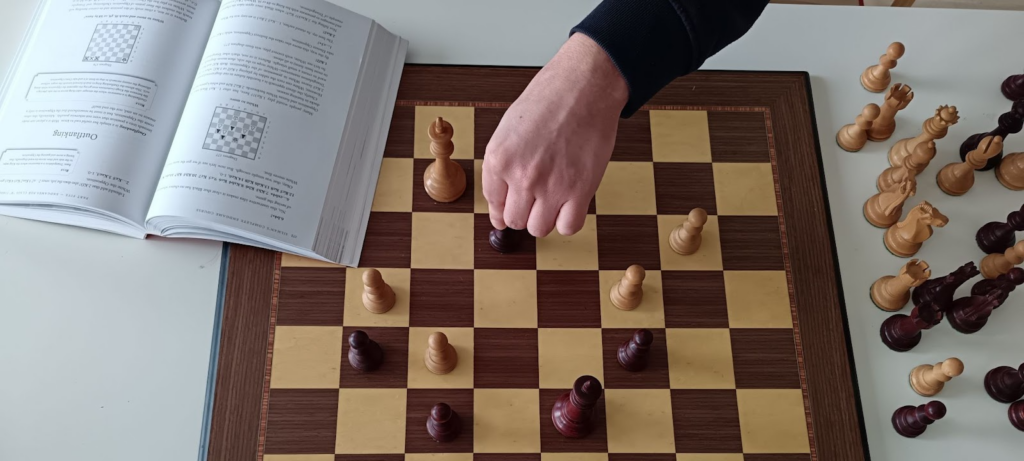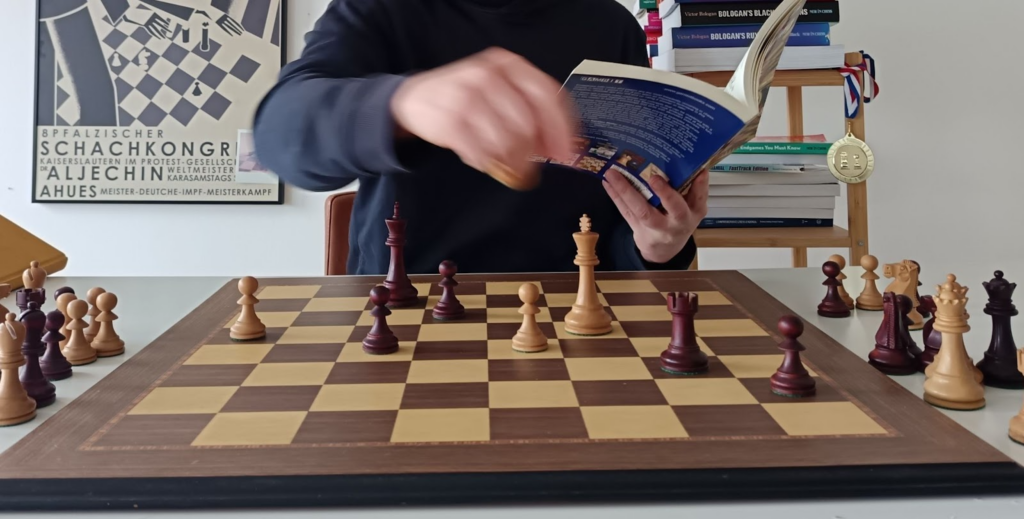Introduction
There are two types of endgame books; the ones on endgame strategy or complex endgames, and the ones on theoretical endgames. For example, Aagaard has recently written A matter of Endgame Technique, the most comprehensive book on endgame strategy ever written. Almost 900 pages of endgame knowledge. Dvoretsky has written his Endgame Manual. A mind numbing guide on every theoretical endgame important for tournament play. I don’t wish to say it’s not a good book, it’s the best, it’s just not an easy read. Those two books combined are enough to teach you how to play endgames on Grandmaster level. They accompany each other. There are other books you can use instead of one or both of them, but you need a combination of strategy and theory.

I have compiled a list of 10 best chess endgame books while trying to include the best of both categories. I have also included books which focus on exercises alone, endgame workbooks. They are, one may argue, the most important ones, since knowledge is meaningless when playing over the board. They develop your endgame skills instead.

I’m of the opinion that each player, especially those just starting out with serious study, should learn the basics on their own, and very quickly, before delving into more complex topics. By basics I mean technical, theoretical endgames essential for understanding all that comes next. So I would advise you to pick up de la Villa’s book and go over the basic endgames many times. Don’t read the chapters, play them out against a sparring partner, an AI, such as Noctie, or an engine. When you’re done with that, move on to a book on complex endgames. I would suggest Hansen, Müller, or Shereshevsky. Any of the three will be good enough. Use it to follow each game analyzed over a real board, making sure you understand each move before moving on. If a position seems difficult to convert or to hold, and the author claims it’s “easy”, don’t listen to them blindly. Play the endgame out! Try to win or hold it. Experience is what matters most in actual play. Thirdly, get an exercise book. Aagaard’s Endgame Play or Endgame corner, which contains 450 endgame exercises will do the trick. Use it to develop your endgame skills solving actual problems. In short, choose a combination of three books; one on technical endgames, one on practical endgames, and a collection of endgame puzzles.
1. Jesus de la Villa: 100 Endgames You Must Know

100 Endgames You Must Know has become the most popular endgame book of all time alongside Dvoretsky’s Endgame Manual. It covers every important theoretical endgame in a simple, easily understandable way, with clear explanations, covering key ideas, patterns and concepts, making it a truly great resource for players of all levels. Each chapter is accompanied by clear instructions of what to do, what to avoid, how to approach a specific type of endgame, and common problems one might encounter while playing them. What’s unique about it is that it only covers endgames that happen frequently in tournament play.
Read 100 Endgames You Must Know
2. Jan Timman: The Art of the Endgame
Solving endgame studies helps your endgame understanding and improves your calculation and visualization, but their main purpose and benefit is broadening your imagination and creativity. Being able to think unorthodoxly, in a creative manner uncommon in real play over the board, helps when dealing with complex positions and helps find resources an untrained eye wouldn’t be able to spot. The Art of the Endgame is considered by many to be the best collection of endgame studies ever written. It will surely enhance your creativity, improve your calculation, and earn you rating points!
3. Mikhail Shereshevsky: Endgame Strategy

Instead of going over theoretical endgames and endless variations, the Endgame Strategy focuses on essential endgame principles, patterns, and ideas one must master in order to navigate complex endgames, regardless of the pieces involved. I can’t think of a book that has helped me win more points and half-points in over the board classical games.
4. Mark Dvoretsky, Artur Yusupov: Technique in Chess

This book is the result of Yusupov’s research and work on Dvoretsky’s famous card files, his notes, unfinished articles, books and various pieces of analyses, practice material, and more, discovered after his recent passing. Using this material, Artur Yusupov, one of Dvoretsky’s most famous students, created Technique in Chess. The most important piece of knowledge, or a skill I think I managed to improve by going through the book, is converting advantages. Having good technique means breezing through to a handshake after going up a pawn instead of getting checkmated trying to keep your extra material. The book devotes three sections to developing your technique and your ability to convert flawlessly.
5. Mark Dvoretsky: Dvoretsky’s Endgame Manual

Probably known as the most difficult chess book ever written, Dvoretsky’s Endgame Manual is a must-read for any improving player. Let me rephrase that. Not a must-read, a must-use book. It is a resource that covers most of what you have to know about technical endgames and almost every tricky endgame position one might encounter in practical play in a notoriously hard-to-understand way. At first glance, it seems as if the book was intended for players 2300 and above, but anyone can and should be using it. In itself it is enough to teach you almost everything. And it’s packed with practical exercises that will make you transform theoretical knowledge into a skill you can use over the board. The Manual also comes in a fast track edition, shorter, and slightly easier to follow for beginners.
Torture yourself with Dvoretsky’s Endgame Manual
6. Jacob Aagaard: GM Preparation: Endgame Play

Endgame Play is for players who have more than covered the basics of both theoretical and complex endgames, and are looking for a tool that will make them sharper, more aware, and better at calculating in endgames. It’s the only book, as far as I know, devoted to calculation in the endgame on such a high level. If you are very ambitious and slightly masochistic, and you have covered the basics of endgame theory and strategy, I would urge you to go through Endgame Play. It’s going to be extremely hard and very rewarding.
Read GM Preparation: Endgame Play
7. Jeremy Silman: Silman’s Complete Endgame Course

Silman’s Complete Endgame Course is a book that tries to bring endgame knowledge to the reader in a new and revolutionary way. It doesn’t contain chapters about pawn endgames, rook endgames, and other themes, but is divided into eight sections according to the reader’s overall chess strength. In each section the reader can find certain endgames which the author thinks are appropriate for the level. As you progress through the book, the author slowly takes you to more complex endgames using the Flowchart method. While this is not the only endgame book you will ever need, it is definitely the one that should find its place on the shelves of every home chess library.
Read Silman’s Complete Endgame Course
8. Karsten Müller, Alex Fishbein: Endgame Corner

Endgame Corner is a collection of 450 exercises designed to sharpen your endgame play and improve your practical decision making in the endgame, a skill essential for any chess player. As the authors put it, Endgame Corner is the endgame “proving ground”. Not a book you will use to expand your theoretical knowledge, but to test it in practical play. That, at the end of the day is all that matters. Knowing the Philidor, the Lucena, or how to defend a Kling and Horwitz in theory is one thing, being able to recognize they are coming, and converting them under time pressure after five hours of play is a totally different story. That is what this book forces you to practice.
9. Lars Bo Hansen: Secrets of Chess Endgame Strategy
I love Hansen’s book because of how easy it is to feel like you’re learning. It’s divided into 4 parts: general principles, pawns, minor pieces and major pieces. Unlike other books that focus on rules and principles, Hansen emphasizes how different pieces should be used or exploited. Alongside that, each chapter is accompanied by examples from real games, mostly from classics, and given snippets of brilliancy in the form of short portions of text explaining key principles such as initiative or suppressing counterplay. What I think stands out the most is Hansen’s chapter on pawn structures and how they determine the flow of play and planning in the endgame. All in all, Secrets of Chess Endgame Strategy is a beginner-friendly endgame book which masters could learn a lot from as well, which isn’t a feat many authors can claim.
Read Secrets of Chess Endgame Strategy
10. Karsten Müller, Wolfgang Pajeken: How to Play Chess Endgames

I would say that this is Shereshevsky’s Endgame Strategy 2.0. Müller and Pajeken have written an excellent book on endgame strategy that covers a vast number of themes, principles, and practical examples in a way that’s easy to follow regardless of your rating. Activity, pawn play, do not rush, exchanges, schematic thinking, initiative, prophylaxis, zugzwang, domination, converting advantages, bishop pair and defense, are how the book is divided, alongside, in my opinion, several less important sections. Each section covers numerous chapters that subdivide the underlying theme. In a sense it’s very similar to most endgame strategy books. Just done better. Much better. It’s well written, the examples are useful, the concepts explained well, and the structure helps the reader digest the material easily. If I had to choose one book on endgame strategy, I would choose this one.
Read How to play Chess Endgames
Endgames are essential for your development as a player. The good news is that they’re relatively easy to get good at, compared to the middlegame at least. Practice makes perfect, and reading any of the books from the above list while playing out every game and position from it will increase your endgame skills rapidly. Focus on the basics first: pawn endgames, rook endgames, and simple rules, such as king activity and piece activity. It’s easy to build on a good foundation. Good luck winning endgames otb!


